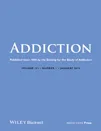| Titre : | Adolescent drinking - a touch of social class? (2017) |
| Auteurs : | H. PAPE ; T. NORSTROM ; I. ROSSOW |
| Type de document : | Article : Périodique |
| Dans : | Addiction (Vol.112, n°5, May 2017) |
| Article en page(s) : | 792-800 |
| Langues: | Anglais |
| Discipline : | EPI (Epidémiologie / Epidemiology) |
| Mots-clés : |
Thésaurus géographique NORVEGEThésaurus mots-clés ETUDE TRANSVERSALE ; ADOLESCENT ; ALCOOL ; PARENT ; CATEGORIE SOCIO-PROFESSIONNELLE |
| Mots-clés: | permissivité |
| Résumé : |
Aims: To estimate whether parental socio-economic status (SES) is associated with adolescent drinking, and the degree to which a possible association may be accounted for by various parental factors.
Design and setting: Cross-sectional Norwegian school survey from 2006 (response rate: 86%). Participants: Students aged 13-14 years (n = 5797), 15-16 years (n = 6613) and 17-18 years (n = 5351), of whom 51% were girls. Measurements: Parents' education was our main SES indicator, and we distinguished between low (7%) and middle/high (93%) educational level. The outcomes comprised past-year drinking and intoxication. We also applied measures on general parenting, parents' alcohol-related permissiveness and parental intoxication. The main analyses were conducted using Poisson regression. Findings: Parents' education had no statistically significant impact on alcohol use among the 17-18-year-olds, while 13-16-year-olds with low educated parents had an elevated relative risk (RR) of both drinking [RR = 1.21, 95% confidence interval (CI) = 1.13-1.29] and intoxication (RR = 1.32, 95% CI = 1.21-1.44). The RRs became statistically insignificant when including all the parental factors as covariates in the regression models. Among adolescents who had consumed alcohol, low parental education was related to more frequent drinking (RR = 1.24, 95% CI = 1.11-1.38) and intoxication episodes (RR = 1.42, 95% CI = 1.22-1.66). Again, the RRs became statistically insignificant when we accounted for all the parental factors. This pattern was replicated when we applied an alternative indicator for low parental SES. Conclusions: Adolescent drinking in Norway appears to be related inversely to parents' social standing. The elevated risk of low socio-economic status vanishes when general parenting, alcohol-related parental permissiveness and parents' drinking are accounted for. |
| Domaine : | Alcool / Alcohol |
| Refs biblio. : | 66 |
| Affiliation : | Norwegian Institute of Public Health, Oslo, Norway |
| Cote : | Abonnement |
 Accueil
Accueil



